The European Accessibility Act brings e.g. e-books and the devices and software used to read them within the remit of accessibility regulation.
In the past year, the term accessibility has been increasingly prominent. The Finnish Act on the Provision of Digital Services, which is binding on the public sector – including universities and universities of applied sciences – entered into force at the start of April 2019.
Public sector actors henceforth have to take into account accessibility in their websites, digital services and mobile apps. All kinds of people must be able to use these services in the same way irrespective of any disabilities or whether they use any assistive devices.
European Accessibility Act
However, regulation is not limited to the public sector. In April 2019, the European Parliament approved a directive known as the European Accessibility Act. This directive brings many new products and services within the remit of accessibility regulation, including terminal equipment, customer terminals, ticket machines, online retail, and electronic books and the devices and software used to read them.
The regulations the European Accessibility Act contains thus also cover the private sector.
The European Accessibility Act, for its part, implements the UN Convention on the Rights of Persons with Disabilities.
The European Accessibility Act is to be incorporated into national legislation by 28 June 2022 and it enters into force in June 2025. It applies to products and services launched on the market after 28 June 2025.
The regulations it contains thus also cover the private sector. A great deal of attention has been paid to the view of the internal market in drawing up the directive. At the moment, national regulations and standards followed vary considerably, making operating in the market that spans the whole of the EU more difficult, particularly for small and medium-sized businesses.
On the other hand, the directive gives what are termed micro-enterprises (fewer than 10 workers or an annual turnover of less than EUR 2 million) the opportunity not to comply with the regulations.
Accessible e-books suit everyone
Readers unable to read ordinary print books, e.g. due to a visual impairment, severe dyslexia or due to another physical or cognitive limitation, are able to use accessible e-books. They may need an audio version of the book, read either by a human or a machine, or they need to be able to enlarge the text or change it into Braille.
Accessible e-books also have any illustrations and diagrams described using alternative (alt) text. Users can modify the book’s features, such as font size, colours or contrasts to suit their own needs.
According to various sources, up to one in five Finns would benefit from more accessible services and products, e.g. due to functional impairments that come with ageing.
An accessible and well-produced e-book suits all readers as it also works more reliably on different platforms. Clear navigation and a logical user interface make reading an e-book a more pleasant experience for everyone.
The European Accessibility Act steers the whole consumption chain
The European Accessibility Act is wide-ranging when it comes to e-books; it takes into account the entire production and consumption chain.
From June 2025 onwards, consumers must be able to obtain and read e-books irrespective of any functional impairment they may have. Searching for and finding books, e.g. from an online store or library, also need to work using assistive technology. All readers must be able to obtain, i.e. buy or borrow, books and they must also be able to read them on an e-reader, using software or in a mobile app.
The European Accessibility Act also demands that products containing both audio and text enable the sound and the text to be synchronised and that navigation is easy, clear and also works on assistive devices. E-readers must have a built-in text-to-speech function. Furthermore, digital rights management (DRM) must not prevent assistive technology from working. The directive also demands that products contain metadata describing their accessibility features.
The European Accessibility Act does not bind producers to a format
The European Accessibility Act does not refer to any particular format or production method. Nor does it make sense to impose a view regarding these at regulatory level as many changes are certain to be seen in this area over the more than five-year period before the regulations enter into force. For example, smart speakers and voice-controlled IT in general are likely to increase in popularity.
It is worth keeping an eagle eye on developments in publication formats and standards. At the moment, epub3 seems to be the format that best meets the requirements of the directive but even that is not completely problem-free. For example, guaranteeing the accessibility of epub books using formatting software demands comparatively sophisticated expertise.
Accessibility requirements will affect the publication process
Although regulation is some way in the future, it is fairly clear that accessibility requirements are going to affect the entire book publishing process.
It is particularly important for those operating in this area to gain an overall picture. What kind of technical and production-related solutions will be needed? How will accessibility requirements affect the different stages of the publication process, product distribution and marketing? Will staff need to update their skills? How to guide writers?
New kinds of products – new readers?
Accessible products enable books to reach entirely new audiences. According to various sources, up to one in five Finns would benefit from more accessible services and products, e.g. due to functional impairments that come with ageing. Audiobook streaming services have already attracted plenty of readers who are not used to buying printed books as customers.
Miia Kirsi is an accessibility specialist at Celia, Finland’s national centre for accessible literature and publishing.
Further information:
Directive (EU) 2019/882 of the European Parliament and of the Council of 17 April 2019 on the accessibility requirements for products and services: https://eur-lex.europa.eu/eli/dir/2019/882/oj
You might also be interested in
Tämä teos on lisensoitu Creative Commons Nimeä 4.0 Kansainvälinen -lisenssillä. Detta verk är licensierat under en Creative Commons Erkännande 4.0 Licens. This work is licensed under a Creative Commons Attribution 4.0 International license.


